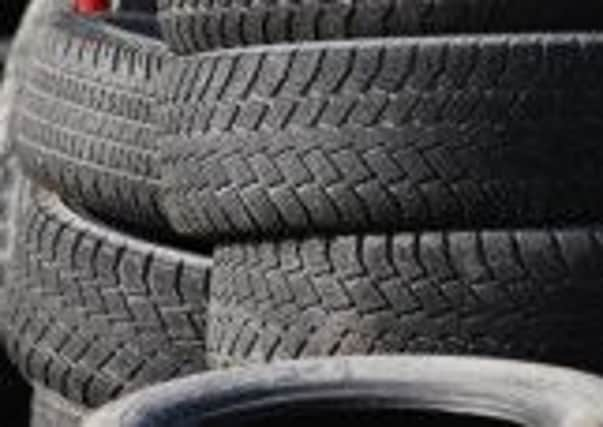Warning over sales of part-worn tyres in Larne


Concerns have been raised that motorists buying part-worn tyres could be taking “unnecessary and potentially dangerous risks” unless they ensure that the meet with the Motor Vehicle Tyre (Safety) Regulations.
Larne Council Environmental Health section has been working with local tyre retailers to ensure they are familiar with and adhering to the requirements of the legislation dealing with the safety of part-worn tyres.
Advertisement
Hide AdAdvertisement
Hide AdOfficers are planning to visit part- worn tyre retailers over the coming months to ensure the safety of part-worn tyres and ultimately the safety of road users.
Commenting on the initiative, director of environmental services for Larne Borough Council Philip Thompson said: “With the price of motoring rising, one in 10 motorists is choosing to purchase part-worn tyres, rather than new tyres.
“It is understandable that during these financially difficult times that people will try and save money where they can. Unfortunately, when deciding to relieve the pressures on the bank balance with the purchase of part- worn tyres, motorists may be taking an unnecessary and potentially dangerous risk.
“All sellers of part-worn tyres should take positive steps to ensure that all part-worn tyres they stock for supply meet the requirements of the regulations and ensure that all relevant staff is made aware of these requirements”
Advertisement
Hide AdAdvertisement
Hide AdA survey was carried out by Northern Ireland’s 26 district councils in 2012 to assess compliance by part-work tyre retailers. Of 37 tyres purchased, findings showed 92 per cent (34 out of 37) of all part-worn tyres tested failed to meet fully the requirements of The Motor Vehicle Tyre (Safety) Regulations 1994
Fifty-seven per cent (21) part-worn tyres tested failed with regard to labelling alone.
Twenty-two per cent (eight) failed to meet the requirements of Section 7(5) which states: ‘The grooves of the original tread pattern of the tyre must be of a depth of at least two millimetres across the full breadth of the tread and round the entire circumference of the tyre’. Twenty-two per cent failed to meet the requirements of Section 7(2) that the tyre must not have :
a) Any cut in excess of 25 millimetres or 10 per cent of the section width of the tyre, whichever is the greater, measured in any direction on the outside of the tyre and deep enough to reach the ply or cord;
Advertisement
Hide AdAdvertisement
Hide Adb) Any internal or external lump, bulge or tear caused by separation or partial failure of its structure; or
c) Any of the ply or cord exposed internally or externally;
d) Any penetration damage which has not been repaired.
Just three of the tyres which were tested fully complied.
Meanwhile, police have warned they will be on the look out for defective tyres during October, with wetter weather increasing the need for adequate tyre tread depth
Local Roads Policing Inspector John Millar said: “Everyone shares the responsibility for road safety, which not only means slowing down, paying greater attention, wearing a seatbelt and never driving after drinking or taking drugs, but also regularly checking that your vehicle is fit to be on the road.
Advertisement
Hide AdAdvertisement
Hide Ad“Tyres are the only contact vehicles have with the road, so it is essential that they have the minimum tread depth of 1.6mm and are free from damage. Technology like anti-lock brakes and skid control systems fitted to many vehicles have been developed to help avoid collisions, but all this technology is rendered practically useless if tyres are badly worn or damaged.
“When police stop vehicles, we pay particular attention to tyres so it’s great to see Northern Ireland Tyre Safety Association highlighting the dangers during Tyre Safety Week 2014. We would encourage people to check their tyres today. At best the consequence of police detecting an illegal tyre is a £60 fine and three penalty points. At worst, the consequence of causing a collision due to a defective tyre doesn’t bear thinking about.”
Times columnist Andrew Clarke on Tyre Safety Month – see page 34